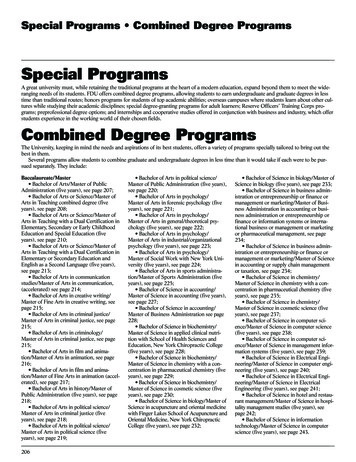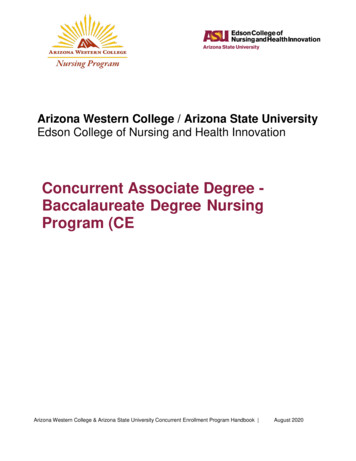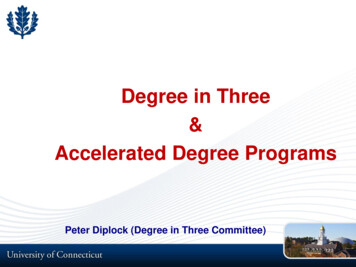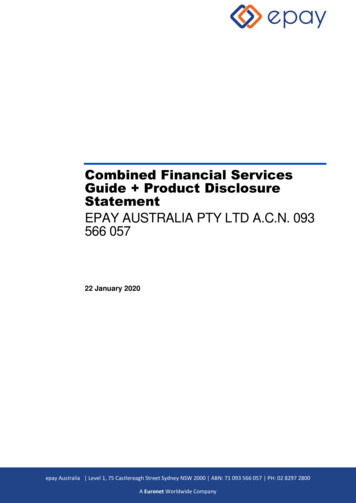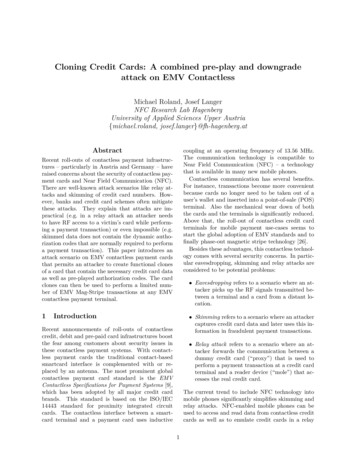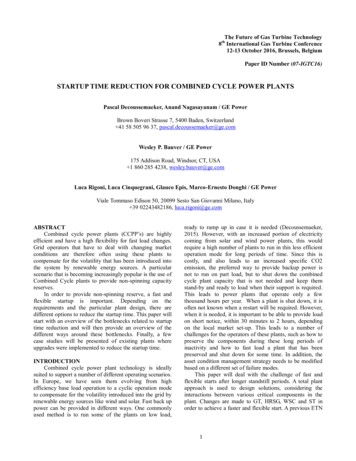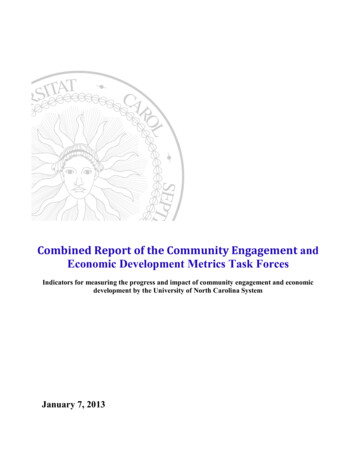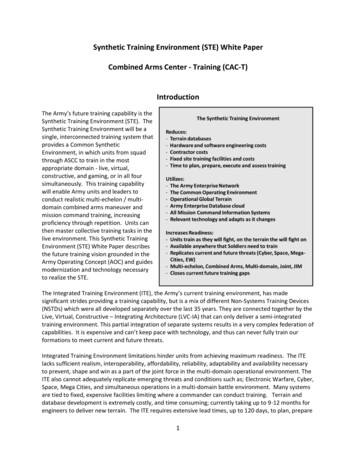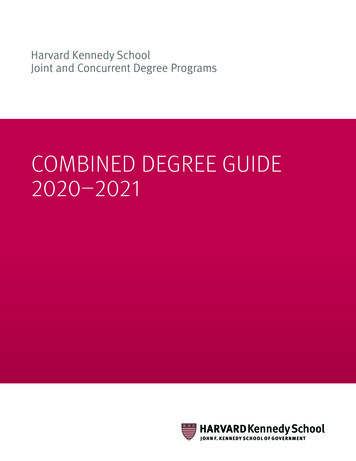
Transcription
Harvard Kennedy SchoolJoint and Concurrent Degree ProgramsCOMBINED DEGREE GUIDE2020–2021
CONTENTSIntroductionAbout the Combined DegreeHow Do Joint and Concurrent Degrees Differ?Approved Combined Degree ProgramsThe Graduate Institute, GenevaAdvantages and Disadvantages of a Combined Degree ProgramAdmission and Enrollment2222445Applying to a Combined Degree ProgramMore Admission InformationEnrolling in a Combined Degree Program566Academic Rules7Logistics12Contact Information16Meeting HKS Course and Residency RequirementsNumber and Type of Required CoursesCross RegistrationResidency RequirementsSwitching to the MPA ProgramPolicy Area of ConcentrationPolicy Analysis Exercise and Secord Year Policy AnalysisStaying in Touch with HKSReceiving or Applying for Financial AssistanceWhich School Provides Financial Assistance? Where and When Do I Apply?Deferring HKS Admission: Impact on Financial Assistance PackageAvoiding Early Repayment When Moving Between SchoolsVisa Documentation for International StudentsSummer Internship FundHealth InsuranceTransitioning Smoothly Between SchoolsGraduating77101010111112121213131414151516
H A R VA R D K E N N E D Y S C H O O L C O M B I N E D D E G R E E G U I D EINTRODUCTIONA number of Harvard Kennedy School (HKS) students pursue joint and concurrent degrees withprofessional graduate schools either at Harvard or other academic institutions approved by HKS facultymembers. This challenging degree track is rewarding, but not for everyone.This guide is designed to help you—current and prospective HKS students—understand the intricaciesof a combined degree experience to determine whether it is the right fit for your unique academic, careerand personal aspirations.If you are a combined degree student currently enrolled at HKS, you will benefit from this guide as well.You will need to have a clear understanding of the rules and regulations at both schools, and this guidecan be useful in navigating the HKS portion of your degree program.About the Combined DegreeJoint and concurrent degrees allow you to earn two degrees in less time by reducing your coursework andresidency requirements. To be eligible, you must be admitted to HKS as well as a professional graduateschool either at Harvard or another academic institution approved by HKS faculty members. In recentyears, about 25 percent of our two-year master’s students enroll in a joint or concurrent degree program.Typically, you complete your degree in one year less than if you earned them consecutively. For instance,it takes five years to earn a Master in Public Policy (MPP) and a Juris Doctor (JD) separately—two years foran MPP and three for a JD—but only four years when pursued concurrently.As a joint or concurrent degree student, you are committing yourself to two degree programs at twodifferent institutions. Because of this commitment, HKS will only award your Kennedy School degree onceyou have met the requirements for both degrees. If you decide to no longer pursue the joint or concurrentdegree, you must satisfy the HKS residence requirement and all other degree requirements to be awardedyour HKS degree.How Do Joint and Concurrent Degrees Differ?Harvard Kennedy School offers two distinct combined degree programs.The joint degree program with either Harvard Business School or Harvard Law School features integratedcoursework that has been developed by faculty members from HKS and HBS or HLS to provide a moreholistic learning experience.The concurrent degree program allows you to pursue degrees at HKS and at a partner school; however, thecoursework is not as closely integrated as the joint degree program. As a student in a concurrent degreeprogram, you are responsible for weaving together the two halves of your learning experience on your own.Approved Combined Degree ProgramsHarvard Kennedy School faculty members approved 22 joint and concurrent degree programs with partnerschools both within and outside Harvard. Aside from U.S. medical schools, it is unlikely HKS will approveadditional joint or concurrent degree programs at this point in time.2
H A R VA R D K E N N E D Y S C H O O L C O M B I N E D D E G R E E G U I D EOnly MPP, MPA/ID or two-year MPA students may enroll in combined degree programs. Joint Degrees with Harvard Business School or Harvard Law SchoolHKS has formal joint degree programs with Harvard Business School and Harvard Law School. Due tothe unique nature of the curricular requirements, you may only enroll in these programs if you are anMPP or MPA/ID student.As an HKS/HBS student, you spend your first year at HKS, the second year at HBS, and one semesterat each school for your final year. As an HKS/HLS student, you spend a full year—either during yourfirst or second year of the combined program—at HKS to complete your core curriculum, after whichyou are in residence at HLS; you register at HKS for the courses you need to complete your HKS degree.As a joint degree student, you must complete specifically designed coursework as well as a capstoneseminar, which includes either the Policy Analysis Exercise (PAE) or Second Year Policy Analysis (SYPA)for HKS/HBS students, or the Integrated Written Project (IWP) for HKS/HLS candidates. Concurrent Degrees with Harvard Divinity School, Harvard Graduate School of Design, HarvardMedical School or Harvard School of Dental MedicineYou can earn concurrent degrees with Harvard Divinity School (HDS), Harvard Graduate School ofDesign (GSD), Harvard Medical School (HMS) or Harvard School of Dental Medicine (HSDM).As an HKS student concurrent with HDS or GSD, you must spend one year at that school, one year atHKS, and one semester at each school for your final year. If you are concurrent with HMS or HSDM,you spend one year at HKS, after which you are in residence at HMS or HSDM and register at HKS forcourses you need to complete your HKS degree. Concurrent Degrees with Schools Other Than HarvardYou may combine your MPP, MPA/ID or two-year MPA degrees with a business, law or medical degreeso long as it is:» a professional degree (e.g., an MBA or JD, not a PHD or academic master’s degree)» at least a two-year program» completed at an institution that has been approved by HKS faculty membersAs a concurrent degree student, you alternate between HKS and the other school throughout yourdegree program rather than completing one degree before beginning the other. You must complete atleast three semesters at HKS. If you are an MPP or MPA/ID concurrent degree student, you must spenda full academic year at HKS to complete your core curriculum, and then split your final year betweenyour two schools. If you are an MPA student, you may split either your first or final year at HKS; if youchoose to split your first year, you must be in residence at HKS for the fall semester.3
H A R VA R D K E N N E D Y S C H O O L C O M B I N E D D E G R E E G U I D EYou may pursue concurrent degrees with the following approved non-Harvard schools:BUSINESS» MIT Sloan School of Management» Stanford Graduate School of Business» Tuck School of Business at Dartmouth» Wharton School at the University of PennsylvaniaLAW» Berkeley Law, University of California» Columbia Law School» Duke University School of Law» Georgetown University Law Center» New York University School of Law» Northwestern University School of Law» Stanford Law School» University of Michigan Law School» University of Pennsylvania Law School» Yale Law SchoolMEDICAL» University of California, San Francisco School of Medicine» Ad hoc programs may be permitted with other U.S.-based Liaison Committee on MedicalEducation (LCME)-accredited medical schools. Email jointconcurrentdegrees@hks.harvard.eduif you are interested in pursuing a concurrent degree with other medical schools. The Graduate Institute, GenevaHKS has partnered with the Graduate Institute, Geneva to offer a two-year dual degree program thatmay only be combined with the Mid-Career MPA (MC/MPA) Program. As a dual degree student, youpursue a Master in International Affairs or a Master in Development Studies at the Institute, and earnan MPA degree at HKS through the MC/MPA Program during your second year. After completing theprogram requirements for both schools, you will earn two master’s degrees in two years rather thanthree (if you had attended the programs consecutively).Advantages and Disadvantages of a Combined Degree ProgramThere are realities associated with pursuing a joint or concurrent degree. Consider the advantages anddisadvantages listed below:4 Advantages—by combining two degrees, you:» develop broader insight from a second discipline» gain additional skills and perspective in a shorter amount of time» save on tuition and enter the job market faster than earning two degrees independently» present additional degree credentials to potential employers Disadvantages—pursuing a combined degree does have some costs. You:» typically graduate with classmates other than those with whom you began your program» take fewer elective credits because of reduced course requirements, but the degree program coreor distribution requirements remain the same» assume extra moving expenses if pursuing a concurrent degree with a school outside theCambridge/Boston area» face logistical challenges as you balance the demands of two different programs
H A R VA R D K E N N E D Y S C H O O L C O M B I N E D D E G R E E G U I D EADMISSION AND ENROLLMENTYou must be admitted to HKS as well as the other school if you are interested in pursuing a combineddegree. Admission to one program does not guarantee admission to the other.Applying to a Combined Degree ProgramDifferent schools have different application requirements and options. See below for a brief explanation. Harvard Business SchoolYou must apply and be admitted to both HKS and HBS in the same year. If admitted to both schools,you can opt in to the HKS/HBS joint degree program. All joint HKS/HBS candidates spend their firstyear at HKS. Harvard Law SchoolYou have the option to apply to the HKS/HLS joint degree program at the same time or apply to oneschool while enrolled in the first year at either school. If admitted at the same time, you can typicallydecide whether to begin the program at HKS or HLS.Once admitted to both schools, you must follow instructions from HKS and HLS to formally enroll asa joint degree student and confirm where to be in residence for each academic year. Note thatpotential financial assistance packages awarded by HKS—including merit-based fellowships—may berescinded if you begin at HLS.Students who are in their second or third years at HLS may not apply to HKS for the joint degree program. Concurrent DegreesThere are two options to apply to a concurrent degree program. You may apply to HKS and thepartner school at the same time, or apply to one school while enrolled in the first year at the other.If you are already in medical school, you should apply to HKS during the admission cycle before youwould like to enroll. The Graduate Institute, GenevaStudents pursuing the combined degree with The Graduate Institute, Geneva spend their first year atthe Institute to pursue a Master in International Affairs or a Master in Development Studies, and theirsecond year at HKS in the Mid-Career MPA Program. Applicants may apply to both programs at thesame time or apply to HKS while enrolled in the first year at the Institute. Applicants who begin theirstudies at HKS are not eligible to enroll at the Institute through this program.5
H A R VA R D K E N N E D Y S C H O O L C O M B I N E D D E G R E E G U I D EMore Admission InformationYou are typically required to submit GRE or GMAT scores as part of your HKS application.If you are an HKS/HLS applicant, you may submit LSAT scores only if you are a first-year at HLS, but youmust submit a written request to the HLS admissions office to have your LSAT scores sent to HKS.If you are an applicant not enrolled at HLS, you must submit GRE or GMAT scores.If you are an HKS/HMS applicant, you may submit your MCAT score rather than the GRE or GMAT, but youmust submit a written request to the HMS admissions office to have your MCAT scores sent to HKS. If youare applying from medical schools other than HMS, and do not have valid GRE or GMAT scores, please bein touch with the HKS Admissions Office.The MPA/ID Program does not accept LSAT or MCAT scores.If you are a first-year HKS student applying to a concurrent degree program that requires a school officialto complete a certification form (“Dean’s Certification” or “Statement of Good Standing”), provide the formand a stamped envelope addressed to the correct admissions office to the Registrar’s Office.Enrolling in a Combined Degree ProgramOnce you are admitted and decide to enroll at HKS and your other school, you must share your plans withthe appropriate HKS office.Prior to matriculating at HKS, you must notify the Office of Admissions by submitting the “CombinedDegree Study Plan” in the New Admit portal. If you are admitted to a joint or combined degree programafter beginning your studies at HKS, you must e-mail the HKS Registrar’s Office (hks registrar@hks.harvard.edu) to notify them of your change in status. Once your status is officially changed, you will haveaccess in my.harvard.edu to submit your “flight plan”—the schedule for when you will be in residence atyour two schools. You must also notify your other school about your joint or concurrent degree status andsubmit any required paperwork.You are expected to follow your submitted flight plan, but if your plans change you must notify theHKS Registrar’s Office as soon as possible and update your flight plan in my.harvard.edu. It is yourresponsibility to ensure that your flight plan accurately reflects your intended enrollments.Please note: while you are pursuing your concurrent degree at a non-Harvard school, Harvard considersyou an inactive student without access to library facilities, gyms, and health insurance.6
H A R VA R D K E N N E D Y S C H O O L C O M B I N E D D E G R E E G U I D EACADEMIC RULESAs a joint or concurrent degree student, you earn two degrees at the same time and are given a“discount” on your coursework and residency requirements. You must keep careful track of the rules andrequirements specific to your course of study. You are responsible for understanding the HKS academicregulations to ensure that you are eligible to graduate from your degree programs.Meeting HKS Course and Residency RequirementsYou are responsible for ensuring that you meet all HKS course and residency requirements to be eligibleto graduate. Number and Type of Required CoursesThe number and type of required courses for your combined degree vary based on your program.Different scenarios are illustrated below.JOINT /IDMPAMC/MPA# of HKS credits52 HKS 3 Joint62 HKS 3 JointN/AN/AHKSrequirements— MPP core— MPA/ID coreN/AN/A— First-Year Joint DegreeSeminar— First-Year Joint DegreeSeminar— Second-Year JointDegree Seminar— Second-Year JointDegree Seminar— Third-Year BusinessGovernmentIntegrative Course— Third-Year BusinessGovernmentIntegrative Course— PAE/Seminar**— SYPA/Seminar— At least 12 electivecredits (Year 3)— At least 8 electivecredits (Year 3)Years total33N/AN/ASemestersin-residence at HKS33N/AN/AMPPMPA/IDMPAMC/MPA# of HKS credits48 2 Joint58 2 JointN/AN/AHKSrequirements— MPP core— MPA/ID coreN/AN/A— Joint Degree ProgramSeminar (Year 3)— Joint Degree ProgramSeminar (Year 3)— Integrated WrittenProject, includingwriting workshopmodule (Year 4)— Integrated WrittenProject, includingwriting workshopmodule (Year 4)— At least 12 elective— At least 12 electivecredits after completioncredits (preferably inof Year 1 at HKSdifferent semesters)(preferably in differentsemesters)7Years total44N/AN/ASemestersin-residence at HKS*22N/AN/A* You must be enrolled in a minimum of 12 credits per semester to satisfy the HKS residency requirement.** If you are a joint or concurrent MPP student and would like to be an International and Global Affairs (IGA) concentrator, you mustalso complete IGA-100, 8 IGA-approved distribution credits, and 4 additional elective credits.
H A R VA R D K E N N E D Y S C H O O L C O M B I N E D D E G R E E G U I D EHARVARDMEDICALSCHOOLorMPPCONCURRENT DEGREESNON-HARVARD CONCURRENT DEGREESor54— MPP core— MPA/ID coreMC/MPAN/A— Four credits ineach of the 3— SYPA/Seminarmethodological—0 to 12 additionalareaselective credits— Additional(depending onelective creditsother school)to fulfill overallrequirementsN/AYears total555N/ASemestersin-residenceat HKS*232N/AMPPMPA/IDMPAMC/MPA485448N/A— MPP core— MPA/ID core— PAE/Seminar**— SYPA/Seminar# of HKS creditsHKSrequirements— Additionalelective creditsto fulfill overallrequirements— Four credits ineach of the 3methodological—0 to 12 additionalareaselective credits— Additional(depending onelective creditsother school)to fulfill overallrequirementsN/AYears total333N/ASemestersin-residenceat HKS*333N/AMPPMPA/IDMPAMC/MPA48# of HKS credits4854HKSrequirements— MPP core— MPA/ID core— PAE/Seminar**— Additionalelective creditsto fulfill overallrequirementsTuck School ofBusiness atDartmouthWharton Schoolat the Universityof Pennsylvania— PAE/Seminar**— Additionalelective creditsto fulfill overallrequirementsBUSINESSStanford GraduateSchool of Business4848HKSrequirementsHARVARDGRADUATESCHOOLOF DESIGNMIT Sloan Schoolof ManagementMPA (HSDM only)# of HKS creditsHARVARDSCHOOLOF DENTALMEDICINEHARVARDDIVINITYSCHOOLMPA/IDN/A— Four credits ineach of the 3— SYPA/Seminarmethodological—0 to 12 additionalareaselective credits— Additional(depending onelective creditsother school)to fulfill overallrequirementsN/AYears total333N/ASemestersin-residenceat HKS*333N/A* You must be enrolled in a minimum of 12 credits per semester to satisfy the HKS residency requirement.** If you are a joint or concurrent MPP student and would like to be an International and Global Affairs (IGA) concentrator, you mustalso complete IGA-100, 8 IGA-approved distribution credits, and 4 additional elective credits.8
H A R VA R D K E N N E D Y S C H O O L C O M B I N E D D E G R E E G U I D ELAWBerkeley Law,University ofCaliforniaMPP54— MPP core— MPA/ID core— PAE/Seminar**— Additionalelective creditsto fulfill overallrequirementsGeorgetown LawNON-HARVARD CONCURRENT DEGREES4848HKSrequirementsDuke UniversitySchool of LawMC/MPAN/A— Four credits ineach of the 3— SYPA/Seminarmethodological—0 to 12 additionalareaselective credits— Additional(depending onelective creditsother school)to fulfill overallrequirementsN/AYears total444N/ASemestersin-residenceat HKS*333N/AMEDICINEMPPMPA/IDMPAMC/MPAUniversity ofCalifornia,San Francisco(UCSF) Schoolof Medicine# of HKS credits485448HKSrequirements— MPP core— MPA/ID coreNew YorkUniversitySchool of LawNorthwesternUniversitySchool of LawStanford LawSchoolUniversity ofMichigan LawSchoolUniversity ofPennsylvaniaLaw SchoolYale Law SchoolTHEGRADUATEINSTITUTE,GENEVA— PAE/Seminar**— Additionalelective creditsto fulfill overallrequirementsOther accreditedU.S. medicalschools on acase-by-case basisDUAL DEGREEMPA# of HKS creditsColumbia LawSchool9MPA/IDN/A— Four credits ineach of the 3—S YPA/Seminarmethodological—0 to 12 additionalareaselective credits— Additional(depending onelective creditsother school)to fulfill overallrequirementsN/AYears total555N/ASemestersin-residenceat HKS*333N/AMPPMPA/IDMPAMC/MPA# of HKS creditsN/AN/AN/A32HKSrequirementsN/AN/AN/A— Four credits in each of the 3methodological areas— Additional elective credits tofulfill overall requirementsYears totalN/AN/AN/A2Semestersin-residenceat HKS*N/AN/AN/A2 MC/MPA Summer ProgramMason Program Summer Seminar(if applicable)* You must be enrolled in a minimum of 12 credits per semester to satisfy the HKS residency requirement.** If you are a joint or concurrent M
Admission and Enrollment Applying to a Combined Degree Program . » a professional degree (e.g., an MBA or JD, not a PHD or academic master’s degree) » at least a two-year program . » Georgetown
